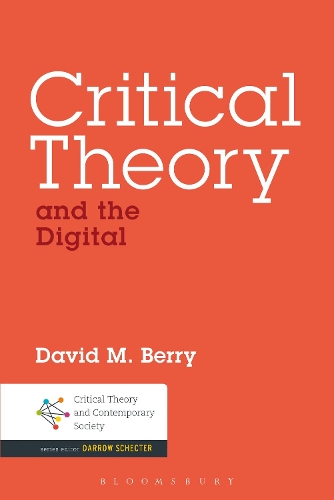
Critical Theory and the Digital
(Paperback)
Available Formats
Publishing Details
Critical Theory and the Digital
By (Author) Dr. David M. Berry
Bloomsbury Publishing PLC
Bloomsbury Academic USA
24th September 2015
United States
Classifications
Tertiary Education
Non Fiction
Media studies
Political science and theory
306.46
Physical Properties
Paperback
272
Width 152mm, Height 229mm
372g
Description
This Critical Theory and Contemporary Society volume offers an original analysis of the role of the digital in today's society. It rearticulates critical theory by engaging it with the challenges of the digital revolution to show how the digital is changing the ways in which we lead our politics, societies, economies, media, and even private lives. In particular, the work examines how the enlightenment values embedded within the culture and materiality of digital technology can be used to explain the changes that are occurring across society. Critical Theory and the Digital draws from the critical concepts developed by critical theorists to demonstrate how the digital needs to be understood within a dialectic of potentially democratizing and totalizing technical power. By relating critical theory to aspects of a code-based digital world and the political economy that it leads to, the book introduces the importance of the digital code in the contemporary world to researchers in the field of politics, sociology, globalization and media studies.
Reviews
In demystifying the digital and bringing it into the realm of critical theory [this] book remains a timely and important work. * Political Studies Review *
An informed and wide-ranging attempt to confront the computational epoch with the tools of Frankfurtian social analysis . . . There is insight in every chapter. -- Dominic Fox, author of 'Cold World', UK * Review 31 *
'Adorno will not be your Facebook friend.' Instead of lamenting the cultural elitism of the Frankfurt School, David Berry reopens critical theory's conceptual toolbox with a renewed curiosity. These days the theorist is no longer a prophet who ponders the world divorced from the materiality of communication. It is not enough to merely explore the technosphere, there is an urgency to radically question digital technologies. In this age of conflict, the neoliberal consensus culture is taken to task by critical theory David-Berry-style. In line with the info-activism of Wikileaks and Snowden, Berry instructs us how to read the black box that dominates our everyday lives and helps us to develop a new vocabulary amidst all the crazes, from speculative realism to digital humanities. * Geert Lovink, Media Theorist, Amsterdam *
Berry's timely book engages with a broad range of topics that define our digital culture. It guides us to the political materiality of software culture with excellent insights. Importantly, this book updates critical theory for the digital age. * Dr Jussi Parikka, Winchester School of Art, author of What is Media Archaeology (2012) *
In this lucid, learned and highly original book Berry confronts the nature of digital knowledge in society through the re-invigorated lens of Critical Theory asking how we can regain control of the knowledge structures embedded in the digital technologies that we increasingly rely upon in daily life. * Michael Bull, author of Sound Moves: iPod Culture and Urban Experience *
Critical Theory and the Digital offers an important new addition to critical theory that explores questions raised by the digital in light of the work of the Frankfurt school. Providing an accessible and critical appraisal of the digital world we live in today, the book argues that critical praxis must today be rethought in light of digital technologies and the affordances that are made available to state, corporate and civil society actors. The book offers both a theoretical and a political contribution: the former through its exploration of how the digital can be read, written, and hacked critically; the latter through its discussion of how the digital can be transformed by political action and the organisation of digital resistance. * Christian De Cock, University of Essex, UK *
Unlike many media studies scholars who refer to the Frankfurt Schools critique of the cultural industries only to show its inapplicability to the open source world of the digital age, David Berry accomplishes the remarkable feat of re-instating that critique for the new brave world that is afforded by digital technology. Easily moving between Heidegger, Adorno and Stiegler, Berry mobilizes a formidable array of theoretical resources in aid of what he calls iteracy, an emerging competence in tracking the contexts in which being digital is continually formed and re-formed. The result is a milestone in both critical theory and the digital humanities. * Steve Fuller, Auguste Comte Chair in Social Epistemology, Department of Sociology, University of Warwick, UK *
Bringing dialectical critique to digital culture, David Berry replenishes the legacy of the Frankfurt School in order to devise strategies to live within and against the real-time streams of computational capitalism. Fusing critical theory with the political economy of social media (think Facebook and Twitter), the surveillance paranoia of NSA, the wild party of Hacklabs, the secret autonomy of cryptography, and the accelerated economy of algorithmic trading, Berry registers the contours of the black box that defines digital labour and life. * Ned Rossiter, Institute for Culture and Society, University of Western Sydney, Australia *
Author Bio
David M. Berry is Reader in the School of Media, Film and Music, University of Sussex, UK.
